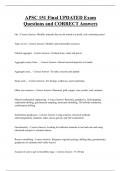APSC 151 Final UPDATED Exam
Questions and CORRECT Answers
Ore - Correct Answer- Metallic minerals that can be mined at a profit, rock containing metal
Types of ore - Correct Answer- Metallic and nonmetallic resources
Natural aggregate - Correct Answer- Crushed stone, sand, and gravel
Aggregate comes from... - Correct Answer- Glacial outwash deposits in Canada
Aggregate used... - Correct Answer- To make concrete and asphalt
Stone used... - Correct Answer- For facings, walkways, and countertops
Other ore resources - Correct Answer- Diamond, gold, copper, zinc, potash, coal, uranium
Mineral exploration engineering - Correct Answer- Research, geophysics, field mapping,
exploration drilling, geochemical sampling, structural modelling, 3D orebody estimation,
confirmation drilling
Exploration geophysics - Correct Answer- Using seismics, electrical methods,
electromagnetism, radiation, radar, micro-gravity, and 3D visualization
Geochemistry - Correct Answer- Looking for indicator minerals in soil and rock and using
elemental isotopes to examine history
Reserve modelling - Correct Answer- Integrates regional geology, drilling data, geochemistry,
geophysics to estimate total viable reserve
Amount of core to get to feasibility stage - Correct Answer- 75-150 km
,Types of deposits - Correct Answer- Magmatic, porphyry, volcanic, hydrothermal,
sedimentary, placer
Magmatic deposits - Correct Answer- Some metals enriched and concentrated during magma
cooling, heavy minerals crystallize early and concentrate at bottom of magma chamber (e.g.
chromite, iron, magnetite)
Porphyry orebodies - Correct Answer- Magmatic and hydrothermal (hot water) - form as
liquid and gas volatiles change chemical state and change saturation limit for sulphide
minerals
Copper porphyry - Correct Answer- Cyclical magmatic intrusion with alteration by volcanic
waters
Volcanic deposits - Correct Answer- Violent kimberlite eruptions bringing diamonds from
upper mantle to surface
Epithermal volcanic deposits - Correct Answer- Near surface deposits precipitated from hot
volcanic waters
What causes different ore types? - Correct Answer- Interaction with temperature, pressure,
volatile gases, and solution as magma rises
Hydrothermal deposits associated with igneous activity - Correct Answer- Hot groundwater
dissolves metals in the presence of salts and hydrothermal fluids move along fractures, cool,
and deposit them as orebodies
Black smokers - type of hydrothermal deposit - Correct Answer- Seawater gushes from
seafloor near spreading centres and precipitates volcanogenic massive sulphide deposits -
deformed by tectonics
Vein deposit - type of hydrothermal deposit - Correct Answer- Hydrothermal fluids move
along fractures, cool, and precipitate metallic ions
, Disseminated deposit - type of hydrothermal deposit - Correct Answer- Precipitation
distributed throughout the rock body
Sudbury Astrobleme - Correct Answer- 10-15 km wide asteroid impact orebody - impacted
rocks contained lots of sulphides which extracted Ni, Cu, and Pt elements
Sedimentary deposits - Correct Answer- During development of Earth's atmosphere, oxygen
reacted with iron dissolved in seawater and caused it to precipitate on seafloor
Placer deposits - Correct Answer- Any deposit that accumulates in loose form due to
sedimentation or where ore has been eroded from one primary source to be further
concentrated and redeposited elsewhere
Mining - Correct Answer- Extracting essential natural resources locked in crustal rock
Mineral resource - Correct Answer- Elements, compounds, minerals, or rocks concentrated in
a form that can be extracted to obtain a useable commodity
Ore reserve - Correct Answer- Confirmed portion of resource that can be extracted at a profit
Exploration for making a reserve - Correct Answer- Confirmation drilling and assaying
(quantifying amount of metal accessible)
Economic factors when making a reserve - Correct Answer- Size and grade of deposit,
mineralogy (mining and processing feasibility), metal price (main risk), corporate strategy
Steps in gold extraction - Correct Answer- Mining, crushing, transport, grinding and sizing,
leaching and adsorption, elution and electrowinning, bullion production, water treatment,
tailings disposal
Smelting - Correct Answer- Extracting metal from ore using heat and melting
Overburden - type of mine waste - Correct Answer- Material above orebody




